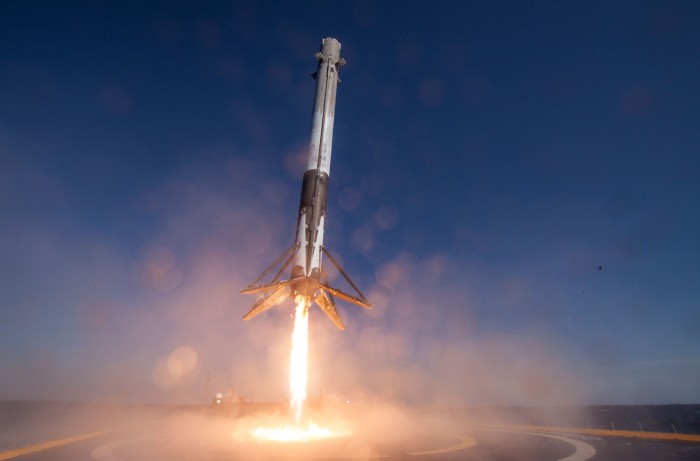Tech CEO Space Race Intensifies

When CEOs are bored of disrupting industries on Earth, their thoughts invariably turn to space.
It’s not news, of course, that the ultimate billionaire’s plaything is a private space company. Jeff Bezos, Elon Musk, and Richard Branson all have their own, in the shape of Blue Origin, SpaceX, and Virgin Galactic, respectively. But this week the three men have all separately announced new ventures that will make use of their space-going schemes.
When Jeff Bezos spoke to the Washington Post—which, incidentally, he owns—he confirmed that he's hatching plans to start shipping to the moon. This isn’t Amazon’s biggest publicity stunt yet, though, but rather a plan for Blue Origin to begin ferrying equipment and supplies to the Earth’s nearest neighbor in order to help set up a “future human settlement.”
The plans would see the company build a lunar lander able to drop off supplies at a location close to the south pole of the moon. That location has apparently been chosen because it’s close to water and has plenty of sunlight for solar power, making it a handy spot for terraforming.
Meanwhile, Richard Branson has announced that his own Virgin Galactic will spin out a standalone company called Virgin Orbit that will launch small satellites into space. The initiative will be based on Virgin Galactic’s existing LauncherOne program, which hauls a small rocket to high altitudes beneath a Boeing 747-400 aircraft, then launches it from mid-air.
Virgin Orbit says it should be able to take up to 200 kilograms of satellite into sun-synchronous orbit, or over 400 kilograms into low Earth orbit. It hopes to make its debut flight before the end of 2017.
All this comes on the back of Elon Musk’s announcement earlier in the week, in which his rocket company, SpaceX, said that it plans to take its first space tourists on a trip around the moon by the end of 2018. Two wealthy individuals have paid a “significant deposit” to spend a week aboard one of the company's capsules, during which they’ll head toward the moon, loop around it, and be returned to Earth.
It’s understandable that the trio are exploring new angles for their companies. The barrier to entry for commercial space flight is falling, which means that more companies are getting involved. While moon deliveries, satellite launches, and manned flights may all sound rather different, they’re linked by the fact that they’re the kind of missions that can—given time—be turned into mundane and repeatable services that other businesses will pay to use. The sooner the companies can establish themselves as the go-to provider for such a service, the more chance they have of shrugging off emerging competitors.
These guys are, after all, well practiced in business here on Earth—so it shouldn’t be so different up there in space.
(Read more: Washington Post, Verge, “SpaceX Plans to Fly Tourists to the Moon—but 2018 Is Ambitious,” “Funding of Space Ventures Gets a Lift”)
Keep Reading
Most Popular
Large language models can do jaw-dropping things. But nobody knows exactly why.
And that's a problem. Figuring it out is one of the biggest scientific puzzles of our time and a crucial step towards controlling more powerful future models.
The problem with plug-in hybrids? Their drivers.
Plug-in hybrids are often sold as a transition to EVs, but new data from Europe shows we’re still underestimating the emissions they produce.
Google DeepMind’s new generative model makes Super Mario–like games from scratch
Genie learns how to control games by watching hours and hours of video. It could help train next-gen robots too.
How scientists traced a mysterious covid case back to six toilets
When wastewater surveillance turns into a hunt for a single infected individual, the ethics get tricky.
Stay connected
Get the latest updates from
MIT Technology Review
Discover special offers, top stories, upcoming events, and more.